Hydrochlorothiazide: What It Is, How It Works, and What You Need to Know
When your doctor prescribes hydrochlorothiazide, a thiazide diuretic used to treat high blood pressure and fluid buildup. Also known as HCTZ, it’s one of the most commonly prescribed pills for hypertension—not because it’s flashy, but because it just works. You take it once a day, and over time, it helps your kidneys flush out extra salt and water. That reduces the volume of blood flowing through your vessels, which lowers pressure on your artery walls. It’s not a cure, but it’s a steady, reliable tool for keeping things under control.
Hydrochlorothiazide doesn’t work alone. It’s often paired with other blood pressure meds like carvedilol, a beta-blocker that slows heart rate and relaxes blood vessels, or amlodipine, a calcium channel blocker that widens arteries. These combinations are common because they attack high blood pressure from different angles. You might also see it used for water retention, a condition where fluid builds up in legs, ankles, or lungs—especially in people with heart failure or kidney issues. It’s not just about pressure; it’s about comfort, too.
People on hydrochlorothiazide often worry about side effects. The most common? Feeling a bit dizzy, especially when standing up fast. Low potassium is another risk—your body loses it along with the extra fluid. That’s why your doctor might check your blood levels now and then. Some folks get more sun-sensitive, so skipping the midday rays helps. And while it’s not a weight-loss drug, many notice they shed a few pounds quickly—not from fat, but from water. That’s the diuretic effect in action.
What you won’t find in this collection are miracle cures or herbal fixes. These posts are grounded in real-world use: how hydrochlorothiazide interacts with other meds, why it’s sometimes linked to raised blood sugar, and how to manage side effects without ditching the pill. You’ll also see how it fits into broader treatment plans—for example, alongside NSAIDs or corticosteroids that can actually raise blood pressure, making hydrochlorothiazide even more necessary. There’s no fluff. Just clear, practical info from people who’ve been there.

Compare Aquazide (Hydrochlorothiazide) with Alternatives: What Works Best for High Blood Pressure and Fluid Retention
Aquazide (hydrochlorothiazide) is a common blood pressure and diuretic medication. Learn how it compares to alternatives like loop diuretics, potassium-sparing drugs, and other antihypertensives - and which might be better for your health needs.